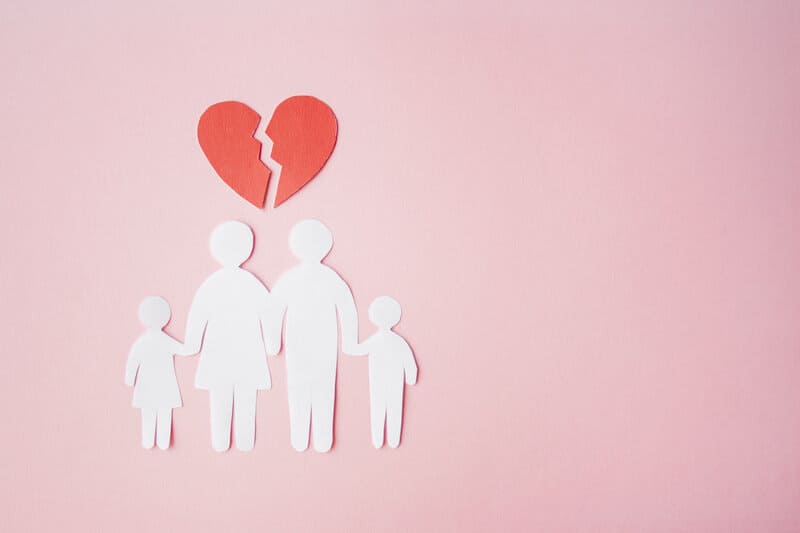
Married couples often jump straight to the divorce option when conflicts or seemingly irreconcilable differences are such that dissolution of marriage feels like the only option. However, legal separation is also a possibility and is overlooked more and more as divorces have become easier to obtain.
Learning more about the differences between legal separation and divorce may create a different pathway forward for you, your spouse, and your family.
Difference Between Legal Separation & Divorce
Legal separation functions like a divorce in many ways. Couples typically decide to live in two separate places and can live their own lives without being accountable to the typical vows of marriage (love, honor, and monogamy). A legal separation may also involve other legal decisions associated more typically with divorce, such as:
- Division of certain assets and/or debts
- Spousal support (aka “alimony”)
- Child custody/visitation
- Child support
A legal separation is filed with the California Family Law courts, and there is no time limit on how long a couple can stay legally separated. Because you are still legally married, neither party can remarry anyone else. If you decide to pursue a divorce, you’ll move forward by filing the paperwork required for a dissolution of marriage. Once the divorce paperwork is officially filed, the divorce becomes final in six months.
As with a divorce, we advise couples to work with a family law mediator whenever possible. In addition to saving you thousands of dollars and keeping you out of the courtroom, mediation is known for creating a more safe, amicable, and peaceful space to come to your determined agreements. Again, this is a smart step forward to keep the energy mutually respectful and positive.
5 Reasons Couples May Prefer Legal Separation
There are many reasons couples prefer legal separation to a final divorce agreement. Most of them fall under the following five categories:
You’re not sure you want a divorce (yet)
I’ve seen it all – including couples who’ve gotten divorced and remarried again. A divorce is a final and legally binding agreement. Even in the best-case scenarios, where a divorce moves forward via non-combative mediation, it is still emotionally and energetically draining.
Sometimes, couples realize that while they are feeling divorce is on the horizon – they aren’t 100% sure it’s what they want. These individuals know they don’t want to divorce in haste or due to disagreements or hurts that time might heal. A legal separation allows them to see what life would be like if they did divorce. Also, legal separation gives them physical and emotional space to work on themselves or on their relationship. That, along with time, may be exactly what’s necessary to reconcile again.
Your religion prohibits divorce
If your religion prohibits divorce, legal separation is often viewed as the way to “get divorced without actually getting divorced.” However, it’s important to remember that the court will handle the asset/debt division, child custody/child support, and potential spousal support payments in the same way it would if you were getting a divorce.
Your personal views or beliefs prohibit divorce
Most couples get married with the intention of never getting divorced. However, some individuals are more committed to never getting divorced than others. If you are one of those people, legal separation is a smart alternative. It gives you space and time to truly take stock and determine what is best for your personal and collective paths forward.
That said, if your spouse doesn’t feel the same, your legal separation won’t and can’t provide protection from getting divorced. Furthermore, if one of you decides to file for a divorce (dissolution of marriage), the California courts will ultimately honor that decision, and you may wind up being divorced anyway. So, while this is a good option for you both to gain a buffer as you make your future decisions, it’s not feasible to escape divorce if that is what the other person wants.
To give the children an adjustment period
This is a gamble. Just as a couple might choose legal separation as their own cooling-off period as they decide whether or not they truly want a divorce, some couples use legal separation as an adjustment period for their children. This is a gamble. It may be worth it if you actually think there is a decent chance of reconciliation. If you are sure you’re eventually divorcing, it’s probably best to skip the legal separation and move forward with a divorce. Pretending otherwise may do more harm than good to the children’s well-being.
In my experience, children assume a legal separation will result in reconciliation and may hold fantasies that crush them later on. So while a divorce is painful and has a negative impact on most children, it’s always best, to be honest, and clear (in an age-appropriate way) about what is happening so children can get the support they need in real-time.
Retain the financial benefits of marriage
Some long-term partners decide to take the plunge because of the financial benefits of marriage. That same idea works in reverse. I have clients who opt for legal separation over divorce because it makes more economic sense to remain married. Couples may choose legal separation to:
- Retain their married tax status
- Continue joint business interests
- Remain on one or the other’s health insurance policy
- To receive future benefits (such as retirement or social security) now or in the future
In this case, legal separation is more like a business decision than one of emotion. It works because it’s legally recognized and allows individuals to live separate lives in separate homes/locations. However, you may find that future partners aren’t entirely happy about it, which may eventually force a divorce decision down the road.
We Can Help You Decide On Legal Separation Or Divorce
If you’re in the process of deciding whether or not to get legally separated or divorced, it’s time to schedule a consultation with a family law mediator. Contact the Law Offices of Gerard Falzone to learn more about your options and to determine whether legal separation or divorce makes the most sense for your situation.









